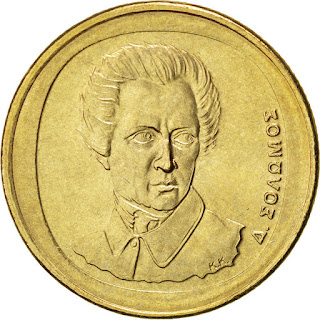Greek Coins 20 Drachmes 2000 Dionysios Solomos
Obverse: The portrait of Dionysios Solomos (1798-1857), a poet from Zakynthos author of the Greek national anthem, is surrounded with a legend which indicates his name in Greek: "Δ. ΣΟΛΩΜΟΣ"
Lettering: Δ. ΣΟΛΩΜΟΣ
Reverse: The facial value is accompanied with an olive branch and surrounded with the inscription "ΕΛΛΗΝΙΚΗ ΔΗΜΟΚΡΑΤΙΑ" (Greek Democracy)
Lettering: ΕΛΛΗΝΙΚΗ ΔΗΜΟΚΡΑΤΙΑ ΔΡΧ. 20 2000
Edge: Reeded.
Years: 1990-2000.
Value: 20 Drachmes (20 GRD).
Metal: Nickel-bronze.
Weight: 7 g.
Diameter: 24.5 mm.
Thickness: 1.8 mm.
Shape: Round.
Dionysios Solomos
Dhionísios, Count Solomós, (born April 8, 1798, Zante, Ionian Islands [now Zacynthus, Greece] — died Nov. 21, 1857, Corfu [Greece]), first poet of modern Greece to show the capabilities of Demotic Greek when inspired by wide culture and first-rate lyrical gifts.
Solomós’ earliest poems were written in Italian, but in 1822 he determined to write in the spoken tongue of Greece. His Ímnos is tín elevtherían (“Hymn to Liberty”) was composed in 1823, and his poem on the death of Lord Byron he wrote in 1824–1825. The unfinished Lambros, a romantic poem of the revolutionary times, was begun in 1826. To this period (1823–28) belong also some shorter lyrical pieces and some satires, of which the most notable is I Ginaíka tís Zakínthou (“The Woman of Zante”).
Solomós’s lyrical exuberance was curbed by a growing preoccupation with German theories of dramatic form and by an inhibiting dissatisfaction with the as-yet meagre resources of his chosen linguistic medium. These impediments, together with a disastrous family quarrel, explain why his major poems of this period remain fragmentary. Nonetheless, O kritikós (1833; “The Cretan”), the second and third sketches of Oi elévtheroi poliorkiménoi (“The Free Besieged”; 1827–1849) — which deals with the siege of Missolonghi — and O pórfiras (1849; “The Shark”), exhibit, even in their fragments, a sense of rhythm, a “curious felicity,” and a melody of cadence not found in his juvenilia.

